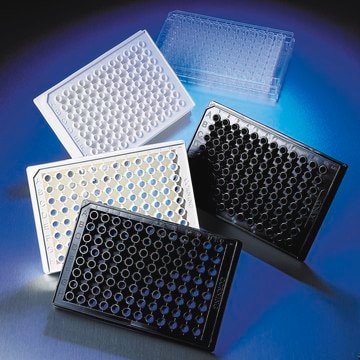CLS3603
Corning® 96 Well Black Polystyrene Microplate
flat bottom clear, black polystyrene plate (Ideal for fluorescent assays), Tissue Culture (TC)-treated surface, pkg of (individually wrapped), sterile, lid
Synonym(s):
96 multiwell plates, 96 well microplates, 96 well microtiter plates, 96 well plates
About This Item
flat bottom clear
polystyrene
round clear wells
cell growth area
cell growth area
Recommended Products
material
black polystyrene plate (Ideal for fluorescent assays)
flat bottom clear
polystyrene
round clear wells
sterility
sterile
feature
lid
skirt
plate format: 96 well standard
packaging
case of 48
pkg of (individually wrapped)
manufacturer/tradename
Corning 3603
size
96 wells
surface area
0.32 cm2 , cell growth area
cell growth area
cell growth area
well volume
360 μL
well working volume
75-200 μL
color
black
suitability
suitable for (fluorescent/luminescent assays)
binding type
Tissue Culture (TC)-treated surface
Looking for similar products? Visit Product Comparison Guide
General description
- Bottoms are 60% thinner than conventional polystyrene plates, resulting in lower background fluorescence and enabling readings down to 340 nm
- Opaque walls to prevent well-to-well crosstalk
- Optically clear flat well bottom permits direct microscopic viewing
- Can be used for both top and bottom reading instruments
- Flat bottoms with 360 μL total volume
- Recommended working volumes of 75 to 200 μL
- Nonreversable lids with condensation rings to reduce contamination
- Sterilized by gamma radiation and certified nonpyrogenic
- Individually wrapped
Legal Information
Choose from one of the most recent versions:
Certificates of Analysis (COA)
Don't see the Right Version?
If you require a particular version, you can look up a specific certificate by the Lot or Batch number.
Already Own This Product?
Find documentation for the products that you have recently purchased in the Document Library.
Customers Also Viewed
Our team of scientists has experience in all areas of research including Life Science, Material Science, Chemical Synthesis, Chromatography, Analytical and many others.
Contact Technical Service







